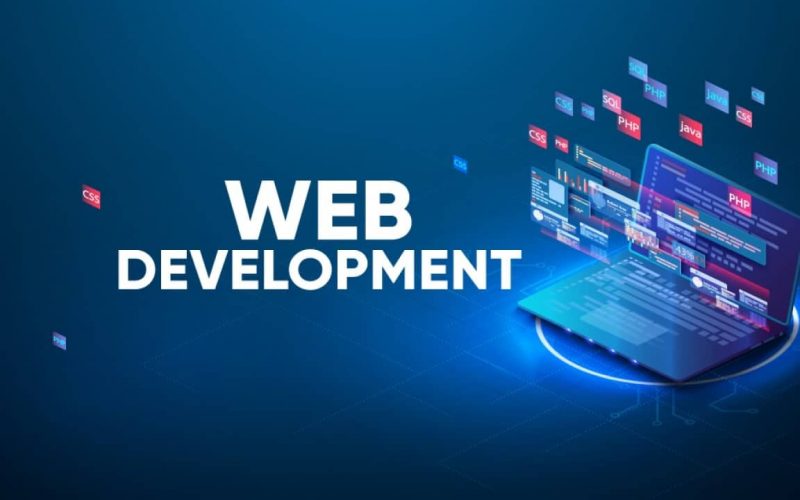Many people worldwide are eager to learn how to build, maintain, and improve websites and web applications as the need for web developers has dramatically increased. Businesses, from small local shops to multinational corporations, need a strong online presence.
This change has created more opportunities for people with the right web development skills. If you want to pivot into this field, you’re not alone. So, we have carefully curated the best web development courses you can take in 2024.
We’ll cover what web development is, the main areas you’ll study, the different career paths you can take, and more.
Table of contents
- What is Web Development?
- Key Areas of Study in Web Development
- Is Web Development Hard?
- Can I take Free Web Development Courses in 2024?
- Best 20+ Web Development Courses to Enroll in 2024
- 1. HTML
- 2. Full Stack Open
- 3. Front End Web Development
- 4. Introduction to Web Designing
- 5. JavaScript
- 6. Web Design
- 7. CSS
- 8. Introduction to HTML5
- 9. Python
- 10. Responsive Design
- 11. Software Development
- 12. Angular
- 13. Programming for the Web with JavaScript
- 14. Computer Programming
- 15. WordPress
- 16. Algorithms
- 17. Ethical Hacking
- 18. Node.js
- 19. React
- 20. React JS
- Frequently Asked Questions
- Conclusion
- References
- Recommendations
What is Web Development?
Web development involves creating, building, and maintaining websites and web applications that run in a browser. This process often includes web design, programming, and managing databases.
It is closely linked to designing the features and functions of apps (web design). However, “development” usually refers to the building process (coding the sites).
The main tools used in web development are programming languages like HTML (Hypertext Markup Language), CSS (Cascading Style Sheets), and JavaScript. Various programs are also available to help build websites, making the process easier than writing all the code from scratch.
Key Areas of Study in Web Development
Web development is a field that brings together many different skills and areas of expertise:
Frontend Development
This area is all about the parts of a website that users see and interact with. It includes working with technologies like HTML, CSS, and JavaScript and using frameworks such as React, Angular, and Vue.js to create visually appealing and responsive websites.
Backend Development
Backend development focuses on what happens behind the scenes of a website. It ensures that servers, databases, and applications work together smoothly. Common programming languages and frameworks for backend development include Python (Django, Flask), JavaScript (Node.js), Ruby (Ruby on Rails), and PHP.
Full Stack Development
Full-stack developers are skilled in both frontend and backend development. They can manage all aspects of building and maintaining a web application, making them versatile and highly valuable in the tech industry.
Database Management
This involves working with databases like MySQL, PostgreSQL, and MongoDB to store, manage, and retrieve data effectively. It’s crucial to ensure that web applications run smoothly and can handle large amounts of information.
Web Design
Web design focuses on making websites look good and easy to use. It involves using tools like Adobe XD, Figma, and Sketch to create layouts, graphics, and user interfaces that are both attractive and functional.
DevOps
DevOps combines software development (Dev) and IT operations (Ops) to improve the development process. It uses practices and tools to make the software development lifecycle faster and more efficient, allowing for continuous delivery and updates to web applications.
Read: How Many Courses Can You Take at University in the UK?
Is Web Development Hard?
Web development can be tough, especially when you’re just starting. You’ll need to learn several programming languages, master different frameworks, and keep up with new tech trends. But with hard work and regular practice, the benefits are great.
There are plenty of helpful resources, such as online tutorials, coding boot camps, and community forums, to guide you and offer support along the way.
Can I take Free Web Development Courses in 2024?
Yes, you can take free web development courses in 2024! There are several great platforms where you can learn without spending a dime:
- Coursera: You can access course materials for free from top universities. While certificates might be a fee, you can often access the course content at no cost.
- edX: Offers free courses from universities around the globe. You can study the material for free, though a certificate usually costs extra.
- Codecademy: This online platform provides free beginner courses in web development, covering HTML, CSS, and JavaScript.
- Khan Academy: Features free lessons on web development basics, including HTML, CSS, and JavaScript. It is one of the best online platforms for free and valuable web development courses.
- freeCodeCamp: This is a fully accessible, self-paced platform that offers a complete web development curriculum, including hands-on projects and certificates.
- Alison: Alison has been there for quite a while. Many people have grown in their chosen career paths simply by enrolling for courses here. Hence, it offers free web development courses, with an option to buy a certificate if you want one.
Best 20+ Web Development Courses to Enroll in 2024
Here are the best web development courses you can enrol in 2024. These courses will not only give you the opportunity to explore tech but will also benefit your career.
- HTML
- Full stack open
- Front end web development
- Introduction to web designing
- JavaScript
- Web design
- CSS
- Introduction to HTML5
- Python
- Responsive design
- Software development
- Angular
- Programming for the web with JavaScript
- Computer programming
- WordPress
- Algorithms
- Ethical hacking
- Node JS
- React JS
- React
See this: Which Course is Best for Art Students in Nigeria? Top 20 Art Courses
1. HTML
Taking an HTML course in 2024 is an excellent way to start your journey in web development. HTML, or HyperText Markup Language, is the core of web creation, allowing you to structure content online. This course teaches you to create and format web pages using HTML tags and attributes.
You’ll learn basic webpage elements like headings, paragraphs, lists, links, images, and tables. By the end of the course, you’ll be able to build simple web pages and have a strong foundation for exploring web development further.
2. Full Stack Open
The Full Stack Open course is perfect if you want to understand front and back web development. You’ll learn the basics, such as HTML, CSS, and JavaScript, plus modern tools like React for the front end.
On the back end, you’ll learn about Node.js and Express, get hands-on with databases using MongoDB, and learn version control with Git. By the end of this course, you can build and launch complete web apps, preparing you for many tech jobs.
3. Front End Web Development
Here, you’ll start by learning the basics, such as HTML, CSS, and JavaScript, which are essential for building web pages. You’ll also look into popular tools and frameworks like React, Angular, or Vue.js.
Throughout this web development course, you’ll pick up skills to design websites that look great on any device and are easy for users.
4. Introduction to Web Designing
If you’re starting and want to learn how to design beautiful and functional websites, out of the web development courses, an Introduction to Web Designing course is a great choice. You’ll begin with the basics of HTML and CSS to build attractive web pages.
The course also covers essential design concepts like colour theory, typography, and layout. You’ll get hands-on experience with tools like Adobe XD, Figma, or Sketch, which help you create wireframes and mockups.
5. JavaScript
JavaScript is a key language for web development, and learning it will help you make web pages interactive. In this course, you’ll start with the basics, such as variables, functions, loops, and events. You’ll also dive into the Document Object Model (DOM), which lets you change the content of web pages on the fly.
As you advance, you’ll explore more complex topics such as asynchronous programming, working with APIs, and the latest features of ES6+. This course will give you the skills to bring your web pages to life.
Also, read: 20+ Useless Courses to Study in Nigeria | 2024
6. Web Design
A Web Design course isn’t just about coding—it’s also about making your website look great and easy to use. Hence, you’ll start with the basics like HTML, CSS, and a bit of JavaScript. But that’s just the beginning.
You’ll go into design principles like arranging things on a page, choosing colors, and picking the right fonts. Plus, you’ll get hands-on practice with popular design tools like Photoshop, Illustrator, or Sketch.
7. CSS
A CSS course is one of the best web development courses to enrol in because it teaches you how to use selectors, properties, and values to style your pages.
The course also covers cool features like flexbox and grid layouts, which help you arrange elements neatly. By the end of the course, you’ll be able to create fantastic designs on any device, phone, tablet, or computer.
8. Introduction to HTML5
An Introduction to HTML5 course is perfect if you want to learn the latest ways to build web pages. HTML5 has new features that make creating modern websites easier and more powerful.
You’ll also learn how to use semantic elements for better website structure and improve your pages’ accessibility and search engine ranking.
9. Python
Python is a flexible programming language that’s becoming more popular in web development. In a Python course, you’ll start by learning the basics, like syntax, data structures, and functions.
As you progress, you will learn more advanced topics, such as object-oriented programming and modules. These frameworks will help you build interactive web applications.
10. Responsive Design
Next on our list of web development courses is responsive design. Here, you’ll learn how to use HTML, CSS, and JavaScript to create designs that adjust smoothly to different screen sizes. You will be taught important topics like media queries, flexible layouts, and resizing images so they fit nicely on any screen.
There’s something called mobile-first design. It teaches you how to make sure your site works perfectly on smartphones before adapting it for larger screens. Plus, you’ll learn about progressive enhancement, a strategy that ensures your site remains functional and stylish, no matter how advanced the technology is.
11. Software Development
A Software Development course gives you a comprehensive view of how to create software, including web applications. You’ll learn programming languages like Java, C++, or Python and key software engineering practices such as version control, testing, and deployment.
For web development, you’ll discover how to use these skills to build scalable and easy-to-maintain web applications.
12. Angular
An Angular course is all about mastering this popular frontend framework from Google. In this web development course, you’ll learn how to create dynamic, single-page applications (SPAs) using TypeScript and Angular’s component-based approach.
13. Programming for the Web with JavaScript
Learning how to use JavaScript to change how web pages look and work by interacting with the DOM (Document Object Model) is one of the things you’d come across in this web development course. You’ll also get the hang of handling events, like what happens when users click buttons or submit forms.
But that’s not all! You’ll also explore server-side programming with Node.js. This means you’ll learn how to build RESTful APIs, which help your web applications talk to each other, and how to work with databases to store and manage your data.
Related: The 10 Easiest University Degrees in the UK | 2024 Rankings
14. Computer Programming
This web development course covers essential topics such as data structures (like lists and trees), control structures (like loops and conditionals), and different ways to approach software development.
By focusing on these areas, you’ll build a strong foundation in coding that will help you tackle complex problems and develop effective software solutions.
15. WordPress
A WordPress course is perfect if you want to create and manage your websites with this popular platform. You’ll learn how to set up WordPress, choose and use themes and plugins, and tweak your site with HTML, CSS, and PHP.
The course also teaches you important tips for improving your site’s search engine ranking and keeping it running smoothly. It’s a hands-on way to get the skills you need to build and maintain professional-looking websites.
16. Algorithms
An Algorithms course helps you learn essential problem-solving methods quickly and effectively. The course also covers strategies such as dynamic programming and greedy algorithms.
While it’s not focused solely on web development, knowing these techniques is key to making your web applications faster and more efficient. This is why you should enrol for it in 2024.
17. Ethical Hacking
An Ethical Hacking course teaches you how to protect web applications from cyber threats. You’ll dive into common security weaknesses, learn how to test for these vulnerabilities and get hands-on experience with various security tools. The course also covers the essential legal and ethical guidelines for hacking for security purposes.
18. Node.js
Out of the web development courses, Node.js helps you handle tasks that take time, like fetching data from a server. Event-driven architecture, which makes your applications more responsive and interactive.
It is in this course you’ll get hands-on experience with working with databases to store and retrieve data, using middleware to handle requests, and deploying your Node.js applications so they can run smoothly
19. React
React courses teach you how to use this popular library to create dynamic and engaging user interfaces.
You’ll start by exploring React’s component-based design, which helps you build reusable pieces of your website. You’ll also dive into managing state and props, which are key to making your apps interactive.
As you progress, you’ll get into more advanced topics like hooks, context API,
20. React JS
In this course, you’ll explore React’s component-based setup and learn to build reusable pieces of your web application. You’ll also learn how to manage your app’s state and use hooks to add functionality.
You’ll also cover some cool advanced topics like the context API, which helps manage data across your app, performance tips to make your app run smoothly, and how to work with other libraries.
You should read this: 10 Fun Majors and Degrees to get into in 2024
Frequently Asked Questions
The best way to learn effectively is usually to combine formal education with self-learning, online guides, and hands-on projects.
It depends on what you want to do with your career. Full-stack developers who can handle front and back work are very flexible and in demand. However, depending on your interests and goals, focusing on just one area can also be a great choice.
Having a degree can be helpful, but it’s not a must. Many successful web developers are self-taught or have learned through boot camps and online courses.
Conclusion
There are great web development courses that can match your needs and help you begin your journey to becoming a skilled web developer. From any in the list we have curated above, choosing the right web development course can set you up for success.
Take advantage of them, invest in your learning, and be well on your way to transition fully into tech.
References
- Blog.hubspot.com – 13 Best Web Development Courses in 2024
- Almabetter.com – Best Web Development Courses
- Brainstation.io – What Is Web Development?






